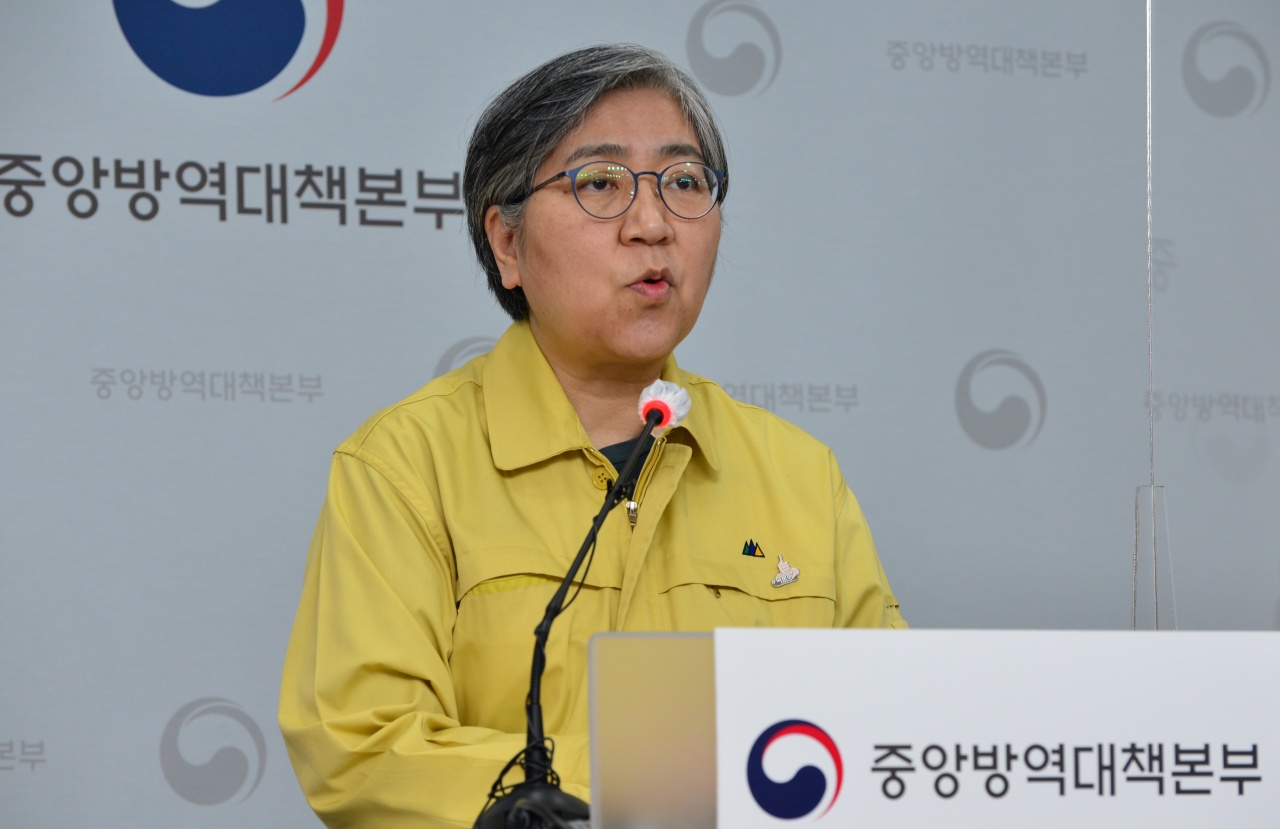No link found yet between COVID-19 vaccines and deaths: KDCA
Korea to reassess AstraZeneca vaccines for those 65 or older
By Kim ArinPublished : March 8, 2021 - 18:08

South Korean public health authorities said Monday that they had yet to find any evidence that COVID-19 vaccines played a role in eight deaths that had occurred among newly vaccinated people.
Jung Eun-kyeong, the Korea Disease Control and Prevention Agency commissioner, told a news briefing that its investigations so far had found no link between the vaccines and the deaths. For three more vaccinated people who died in the past day, investigations will proceed swiftly, she said.
Jung said that all of the 11 people who died after getting vaccinated were patients at long-term care facilities with chronic medical conditions. Autopsies will be performed on four of them. The exact cause of the fatalities will not be disclosed for privacy concerns, she added.
Since the national vaccination campaign kicked off Feb. 26, some 316,865 people have been inoculated with the first dose as of Sunday midnight -- 311,583 with the AstraZeneca vaccine and 5,282 with the Pfizer vaccine -- according to the agency. This translates to 41.5 percent of the top priority group having been vaccinated.
Of all those vaccinated, 3,904 people reported having side effects, apart from the 11 who died. The vast majority, or 3,866, experienced mild, known side effects of COVID-19 vaccines such as fever, fatigue, headache, muscle ache, chills and pain or redness at the injection site. Such side effects go away within a few days, Jung said.
Another 32 reported more serious reactions similar to anaphylaxis, or severe allergy. One person went into anaphylactic shock and then recovered. Anyone with a history of allergic reactions to a vaccine should not receive it, the agency said. Five people reported seizures, four of whom were hospitalized.
The agency also said it may retract its initial decision to withhold the AstraZeneca COVID-19 vaccine from use on older people, as the current guidelines would leave out some 370,000 nursing home residents aged 65 or above. The final call is to be announced later this week.
Over the weekend, two National Medical Center nurses tested positive for COVID-19 about a week after receiving their first doses of the vaccine.
According to the state hospital, a nurse at a ward for patients with mild cases was diagnosed with COVID-19 on Saturday, after developing symptoms the previous day. The hospital tested all the staffers from the same ward and found another nurse had the disease.
The other 40 whose tests yielded negative results are being quarantined for two weeks as a precaution. The patients were transferred to different wards within the hospital.
The hospital said the two nurses had worked their night shifts together last week, and that they believe that may have been the point of transmission.
Although both nurses got their Pfizer jabs Feb. 28, they seem to have contracted the disease before they could build enough immunity, the hospital said.
“It typically takes at least 10 to 14 days for your body to build up some protection after vaccination,” said infectious disease professor Dr. Kim Woo-joo of Korea University. Although interim data from the UK shows that a single dose confers some protection, two full doses are required for the vaccine to take maximum effect.
But even being fully vaccinated doesn’t “completely eliminate” the risk of getting infected, Kim said, which is why practicing social distancing and wearing face masks still matters post-vaccination.
“Besides, we don’t know whether vaccinated people spread the virus to people who aren’t yet vaccinated,” he added.
Preventive medicine professor Dr. Jung Jae-hun of Gachon University said newly vaccinated people should keep in mind that “there is a chance, albeit small, the vaccine won’t protect you.”
“If you work in a hospital or another high-risk setting, you still need to exercise the same levels of precautions that you have been exercising prior to vaccination,” he said.
He said there had been a documented instance of a US patient being inoculated with a COVID-19 vaccine during the incubation period, and that no safety issues had surfaced. It was unknown whether the vaccine can help fight the infection in such a case.
Meanwhile, Sunday’s count of new cases fell slightly to 346 -- 335 locally transmitted and 11 imported -- due to a decline in testing over the weekend. The cumulative number of cases is now 92,817.
Korea lifted most COVID-19 restrictions and reopened businesses three weeks ago, and is looking to further ease its social distancing rules, citing the improved capacity of hospitals and contact tracing programs.
But modelers warn infections in Korea are likely to climb if the current level of social distancing is maintained. The COVID-19 modeling team at the National Institute for Mathematical Sciences and the Korean Mathematical Society said in Friday’s report that daily case numbers could approach 500 in about two weeks’ time.
In a closed-door briefing Monday morning, Ministry of Health and Welfare’s spokesperson Son Young-rae said the ministry would decide whether to move on to the new and relaxed social distancing on Friday.
By Kim Arin (arin@heraldcorp.com)



![[Exclusive] Korean military set to ban iPhones over 'security' concerns](http://res.heraldm.com/phpwas/restmb_idxmake.php?idx=644&simg=/content/image/2024/04/23/20240423050599_0.jpg&u=20240423183955)

![[Graphic News] 77% of young Koreans still financially dependent](http://res.heraldm.com/phpwas/restmb_idxmake.php?idx=644&simg=/content/image/2024/04/22/20240422050762_0.gif&u=)



![[Pressure points] Leggings in public: Fashion statement or social faux pas?](http://res.heraldm.com/phpwas/restmb_idxmake.php?idx=644&simg=/content/image/2024/04/23/20240423050669_0.jpg&u=)










